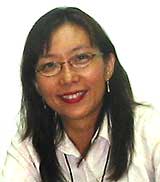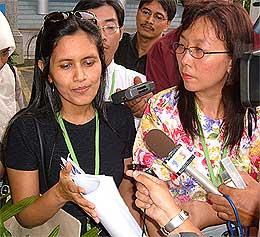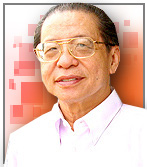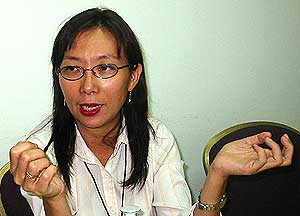![]()
ALTHOUGH Teresa Kok's political career officially started in 1990 when she became the political secretary to Parliamentary Opposition Leader and then DAP secretary-general Lim Kit Siang, the seed of her interest in politics and passion for justice had been sown early back in her university days.
 As an undergraduate at the School of Communication at Universiti Sains Malaysia, Kok was already an activist for the Chinese Language Society on campus. Throughout her course, she was constantly reminded of the roles of the media and how political powers tried to curb media freedom to protect their own interests. The oppression that she faced when the authorities restricted the use of Chinese in her society's pamphlets, notices and posters aroused and prompted her to seek justice. Feeling that she had to defend her mother tongue, she joined the movement to advocate more rights for the use of Chinese and often brought the issue up to the Student Affairs Department in the university.
As an undergraduate at the School of Communication at Universiti Sains Malaysia, Kok was already an activist for the Chinese Language Society on campus. Throughout her course, she was constantly reminded of the roles of the media and how political powers tried to curb media freedom to protect their own interests. The oppression that she faced when the authorities restricted the use of Chinese in her society's pamphlets, notices and posters aroused and prompted her to seek justice. Feeling that she had to defend her mother tongue, she joined the movement to advocate more rights for the use of Chinese and often brought the issue up to the Student Affairs Department in the university.
Her political involvement should probably be attributed to the timeliness of the events that were happening around her while she was in university, when she faced the greatest challenges to her intellect and principles. The backdrop of the late 1980s was Operasi Lalang , in which opposition leaders and social activists were arrested under the ISA. It was the arrest of church activists that baffled her most and caused her to start questioning the country's political system. Although the political repression practised by the government enhanced the political awareness in her, it did not catapult her into wanting to become a politician overnight.
 Rather, her journey to becoming a politician was a slow process of years of gradually approaching the core of politics from its peripheries, which culminated in her conviction that she could serve the people better by becoming a politician.
Rather, her journey to becoming a politician was a slow process of years of gradually approaching the core of politics from its peripheries, which culminated in her conviction that she could serve the people better by becoming a politician.
Operasi Lalang an eye-opener
The end of Operasi Lalang in 1987 saw the split of Umno when Tengku Razaleigh Hamzah formed Semangat 46 and worked with the DAP. In 1990, when the Chinese community declared that they wanted to support the opposition party to forge a two-party coalition, Kok had just graduated from university and returned to Kuala Lumpur, her hometown. She was then invited to join the DAP. As if such a courtship was inadequate, she declined the offer, but did not mind helping out DAP in their election campaigns. In the elections that year, she joined Dr Kua Kia Soong's campaign team. Kua was the DAP candidate for Petaling Jaya.
When there is competition for power, humans reveal their ugly sides. "It was a very good experience for me," she recalls of her helping out with Kua's election campaign.
"I saw how people could resort to dirty tricks during elections like when Tengku Razaleigh was accused of helping PBS to turn Sabah into a Christian state after he was seen wearing the Kadazan headgear, which was alleged to bear the Christian cross."
As a result of the allegation, DAP fell short of three seats to capture the Penang government. This left a great impact on her and caused her to seriously consider becoming a politician. After the 1990 elections, Kok went to work in an event organising company and also reflected hard on the situation. She felt that working as a money making tool for her company was not what she had wanted to do in life. After experiencing the excitement of an election campaign, her work was mundane by comparison.
 When she was offered to become Lim Kit Siang's political secretary, she took up the offer. This marked her first official step in her political career that allowed her to advance her genuine passion to serve the people.
When she was offered to become Lim Kit Siang's political secretary, she took up the offer. This marked her first official step in her political career that allowed her to advance her genuine passion to serve the people.
She admits that to a woman, politics is tougher than other professions and it is especially so to her because she is in an opposition party. In this country where politics is still a male-dominated field, women's involvement is still rare. Although there are prominent female leaders who have outshone men in their report cards, various forms of discrimination against women still exist today, whether explicit or subtle. Laws on sexual harassment are still absent in the country although various groups have fought for it.
Kok thinks that there should be such laws but questions the effectiveness of their enforcement because inherently, we live in a culture where men still do not give women their fullest respect. She has played victim to male chauvinism in the country when she has to endure sexist remarks by her male counterparts. However, she believes that women and men are equally capable of excelling in a political career, which she fondly calls her "vocation" due to her Catholic faith, because they go through the same kind of education and training.
Complement each other
Since becoming a politician is not a job that requires physical strength, she does not think she is particularly disadvantaged. To men who dismiss her ability to be a competent politician, she feels that it would only do them good that they accept her because women and men have their own strengths and weaknesses and they can complement each other in an organisation. All that matters is experience, she believes. While working as Lim Kit Siang's political secretary, she was considered to be in the core power circle and entrusted with many important jobs and thus learnt a lot from him.
For someone who takes an interest in the plight of others and does not tolerate injustice, Kok sees herself as a social activist at a higher level. No doubt, being an MP allows her to champion the causes of the issues she can personally relate with, such as women and Chinese education. However, she also likes initiating the interest of the public in less popular issues. She is an active lobbyist for democracy and human rights in Burma. She was one of the few who defended the rights of the indigenous people in Sarawak during the construction of the Bakun dam.
 While many politicians shun talking about sensitive issues to avoid offending other people, Kok raises awareness about sensitive issues in a tactful manner. Although she likes to raise new issues, she also furthers the causes of he party by repeating problems that need to be treated, like the brutality of police officers, in Parliament. The Parliament did respond to some of the issues that she and the other MPs raised. Hence her effort and commitment to these causes have not been wasted and this shows that she acts as a good balance in Parliament.
While many politicians shun talking about sensitive issues to avoid offending other people, Kok raises awareness about sensitive issues in a tactful manner. Although she likes to raise new issues, she also furthers the causes of he party by repeating problems that need to be treated, like the brutality of police officers, in Parliament. The Parliament did respond to some of the issues that she and the other MPs raised. Hence her effort and commitment to these causes have not been wasted and this shows that she acts as a good balance in Parliament.
Ultimately, the job of an MP is to represent his or her people. Kok's humility, friendliness and approachable disposition allow her to be an effective one. Not only has Kok represented her constituency in various issues, from the most trivial to the most controversial, she is also still constantly playing an active role in garnering inputs from her people through the different channels that she has created for them, most famously through her blog.
It seems like if her constituents want to demand something and bombard her with requests, there is no way she can escape them.
SU HUI HSING is an intern with Malaysiakini . Comments can reach Rentakini by emailing [email protected] . Selected letters will be published

